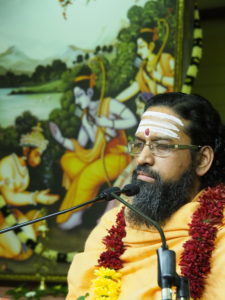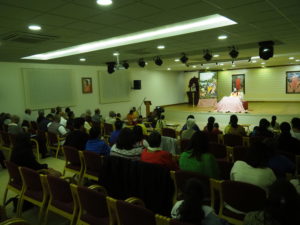Talks on ‘Aranya Kand’ – Part 1 – July 2019
Talks on “Aranya Kand – Based on Valmiki Ramayana” – Part 1 – by Swami Abhedananda
(Gyan Yagna conducted from 1st July till 6th July, 2019)
Key Points from the Discourses
Day 1
Swami Abhedanandaji opened the July yagna on Valmiki Ramayana with a full-throttle, high-impact satsang, shaking us out of our complacent approach towards the time we have left in this human birth.
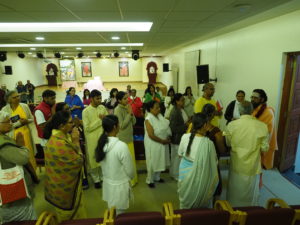 “Use your time wisely”, was Swamiji’s most compassionate message and warning to us all. Full of pointers on how to live a dharmik life which is full of sacrifice, how to develop dispassion & detachment, the talk was an indispensable road-map to progress on the spiritual path.
“Use your time wisely”, was Swamiji’s most compassionate message and warning to us all. Full of pointers on how to live a dharmik life which is full of sacrifice, how to develop dispassion & detachment, the talk was an indispensable road-map to progress on the spiritual path.
We bring you the most salient points as below:
Bharatji’s Character: Reaching the Higher through Sacrifice
- We saw the glorious character of Shri Bharatji in Ayodhya Kand that even when he got the kingdom of Ayodhya, he did not take it.
- Generally we are very right-oriented people. We constantly think of what we should get.
- Bharatji demonstrated a beautiful aspect of dharma—that we should perform such actions through which we decrease our vasanas and increase our independence. The glory of a person is not in how much he can enjoy the world, but in how much he can give up the world.
- It is not important that whatever you have, you should enjoy that. Suppose you have money:
- Instead of enjoying luxuries with your money, it would be better to use that money to drop some negativity of your mind. That would serve a bigger purpose.
- Instead of going on expensive holidays or collecting luxury items, decrease your greed and attachment to money by offering it to the Lord, or doing charity.
- Shri Bharatji is the acharya (teacher) of Love, Service and Sacrifice. He went to Chitrakoot to offer the kingdom to Bhagavan Ram. Everything belongs to Bhagavan only. Moment we possess something as our own without making Bhagavan as partner, that thing is sure to become a curse upon us.
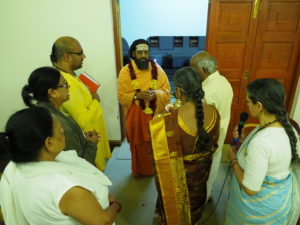 Dispassion and Detachment are our Key Requirements
Dispassion and Detachment are our Key Requirements
- In life, we are not troubled by something which we have left, but by things which we can’t leave.
- Dharmik life is a training through which our sacrificing capacity increases. Not by leaps and bounds, but slowly and gradually.
- Measure your life’s Bigness not by how much wealth and property you have accumulated, or how settled your children are, but by– ‘What all mental weaknesses such as hatred, obsessions, attachments have I left? How much anger I could control? How much have I stopped getting bothered by trivial issues?’ This is the right measurement criterion. This alone shows how dharmik you are, and how strong is your mind.
- As we grow in age, more people look to us for support. A person should be such, that he is ready to support the system around him; that others can depend on him. And that is possible when the person is situated in dharma, is full of faith, and has detachment from the world.
- A detached person alone can love someone in the true sense, can shoulder big responsibilities, and can handle situations properly. Attached people are easily over-powered and overwhelmed by emotions for the people whom they are attached to.
Understanding the temporary nature of the world
- Bhagavan Ram says to Bharatji, ‘All that we accumulate will eventually decay and all that is high will go low one day’. This is the nature of the world.
- Somebody is on the top one day and on another day, he is at the bottom. Those who were once big politicians and businessmen, today they need help to even sit up straight.
- All people, whether they are people we like or dislike today, will soon depart. Every meeting in life ends in departure.
- All life will end in death. Do not claim, ‘I know this already’. Everybody ‘knows’ it, but we have to repeat it in our mind, it should sink in. This contemplation helps in reducing our raag (attachment) and dwesha (hatred).
Hearing about Death – A Sadhana
- Death is extremely close to us. In Hinduism, hearing about death is a sadhana. It helps us understand where we stand and how many years we have wasted.
- When we hear the news of someone passing away, we have to personalise the news, understanding that this will happen to our body too, soon.
- As two logs of wood meet in the ocean, bang each other for some time and with the next wave they get separated, so too, in our lives we meet husband, wife, children, mama, chacha, etc. just to be separated with the next rising wave.
- It is a Sadhana to go to a funeral. When you go to a funeral, pay attention to your bhaav (emotion). Picturise your body in the same way, and see how everything is false here. Realise how flimsy and finite the world is.
Use Your Time To Get Big Earnings
- Like we cannot take the Ganges back to its source, we cannot get lost time back. Use the time that you have wisely, put your mind in dharmik actions and in Bhakti (devotion).
- With the limited time we have, let us earn something bigger in life. Do not waste your earning capacity. When we leave this body, we must leave with more dispassion and more purity of heart.
- When death arrives—there should be no regrets, nor should we be hankering after anyone—we should be thinking of the Lord alone. Start preparing for that moment from right now.
- Put your mind in something bigger. In this birth, either do something so that you are not born again; or prepare yourself so that in the next birth, you get more opportunity to enter spiritual life with a more prepared mind.
- Live with the world but use the world for self-purification. Use every person around you for sadhana, for pleasing God, and for growing dispassion. Through children – practice sadhana of patience, through somebody very good around you – try to imbibe his qualities, through an angry person – practice tolerance, through someone who neglects you – try to still love him.
- Serve everyone. Do more Jap, do more puja.
- Swami Sivananda used to advice to make a daily sadhana diary. Be answerable to God. If you miss sadhana, compensate for it. Be ruthless with your mind, don’t be soft. Be soft with the world, not with your mind.
Day 2
On Day 2 of the Valmiki Ramayana yagna, Swamiji encouraged us to set a very high goal indeed for ourselves. We must become Mahatmas, said Swamiji, by consistently giving up our smallness for the Higher.
Sacrifice, Sacrifice, Sacrifice!
- If someone is sad, it is because he is holding on to something small, he is not making someone big happy in his life.
- Sometimes we say, ‘My God and my Guru are not happy with me’. A simple set of questions for us is – ‘What did we give up for God, for Guru? Did we give up your anger, comforts, hatred, attachments?’ If we give up, it is not possible that our God and Guru won’t be happy.
- Every big thing and big joy in this world is—as if—covered. It is covered due to lack of sacrifice. Shri Bharatji’s glory was that he gave up the kingdom so that the joy of Bhagavan Ram could be uncovered.
- Bigger is the renunciation of the person, bigger is his ability to get the Higher Joy. If we have not had big experiences in life, it is only because we have not given up sufficiently.
- When someone complains that he cannot do japa, puja or meditation, it only means that he has not sacrificed enough for doing his sadhana. If he sacrifices, he will be able to do it.
- Each moment demands some renunciation from us. There is a silent call in each moment which tells us to give up our laziness, ahankaar, attachment, insistence, comfort etc. But we are so habituated to holding on to our pettiness and negativities that we don’t listen to the call to give up.
- And because we don’t listen to this call, we are stuck with low and middle-class joy. If somebody’s joy is Higher, then we can infer that his sacrifice is more. Higher joy means the joy which is independent, long-lasting and cannot be snatched away.
- Our giving-up capacity should increase with time. The capacity to give up ego, falsehood, attachment, sensuality, etc. should increase. It is not automatic. We need to put in effort for that.
Bhagavan Ram’s Egoless & Detached Nature
Bharatji says that Bhagavan Ram is so great that He is not shaken by situations.
- If somebody is not shaken by sorrows, it means that he doesn’t have attachment and ahankaar (ego).
- Bhagavan Ram’s kingdom was taken away, but He had no sorrow; because He had no attachment to the kingdom. When we are not attached to a certain object, then the presence or absence of that object doesn’t bother us.
- Similarly, when we don’t have any desire from others, then others cannot make us unhappy.
- An egoistic person’s problem is – he doesn’t want that anybody should see him as small. When ahankaar is absent, the person already sees himself as small. He is not troubled by how others look at him or treat him.
- There was no ahankaar in Bhagavan Ram. In no time, He took off His royal attire and put on the bark of the tree. He didn’t feel any inferiority. He didn’t think ‘What will people think? What is my fault?’ etc.
Situational sorrow v/s Emotional sorrow
- In life, there can be situational sorrow but making it into emotional sorrow is our own foolishness. Ramji had situational sorrow, but not emotional sorrow. He didn’t internalize the situation.
- Anybody would have been sad in His situation, but not Bhagavan Ram. Because in Him, there was no ahankaar to catch and personalize the sorrow.
- An ahankaari person lives a very personal, ego-centric life. ‘My success, my failure, my joy, my sorrow, my insult, my honour’–he embraces everything except God. He doesn’t personalize God.
- Success in life is to personalize God and impersonalize all worldly things. An ahankaari person cannot do that. And so, he remains troubled.
Maturity comes from Right Intellect
- Maturity of a person is, how big difficulties he can take without breaking or becoming sad, and still continue to give joy to others.
- The thinking capacity of a matured person is very big, he has a very big filter in him. His every response is very well thought-out.
- An immature person has no buffer in him to analyse the situations before acting. He acts upon his erratic and irregular impulses, which he then tries to justify.
- Bharatji says we must live like a dead person, i.e., with no demand, complaint or anger. Whether we get attention and love or not, we should be always fine, as if our mind is dead to selfishness.
- We must live without any insistence. It should not matter much whether we have something or not. Learn to live with minimum and adjust with whatever you have.
- If we have to be choosy, we must be choosy regarding our thoughts. Living such is the laabh (profit) of having right intellect.
Become a Mahatma!
- We are born to give love, and to offer and surrender ourselves to the Lord.
- A Mahatma is the one who thinks how many people are happy with his happiness; whose reference point is the happiness of God. A Mahatma does not live for small, low-class joys.
- It is important to become a Mahatma, because if we don’t, we will be in trouble. The moment we put our selfish desires ahead, there will be someone who will come to obstruct our desires.
- A Mahatma is the one who has calibrated his mind such, that his habits are non-vulnerable and non-crushable. If one desires to do puja, paath or parayan, or decides to be humble, nobody can contradict his desires.
- On the path to becoming a Mahatma, keeping vows is essential. When we fulfil our vows, we feel more confident because the power of the Lord is now with us.
Day 3
On Day 3 of Valmiki Ramayana yagna, Swami Abhedanandaji gave us some extremely practical pointers to measure our spiritual progress. Swamiji blessed us with a close look at some of the most essential components of dharma, and gave step-by-step instructions on how to both recognise, and hold on to Satyam (Truthfulness).
Sharing below some key points:
The glorious portion of Valmiki Ramayana where Shri Bharatji meets with Bhagavan Ram in Chitrakoot, is the meeting of two Maha-tyaagis, the meeting of two greatest of renunciates.
Between them, there is a tough competition. But it is a divinely sweet tussle, because they both want to renounce for each other.
- Ordinary people compete to get something. But Lord Ram and Bharat are competing to give up very big things.
- The true value of a person is measured not through his outer affluence, but by ‘what’ he has given up in life, and ‘for whom’.
- We should increase our capacity to give up lower emotional joys of ego, attachment, hatred etc., for the Higher.
- The joy of egoless-ness is much more than the joy of an egoistic person. The joy of surrender is much more than the joy of pursuing our own agenda. The joy of detachment is much more than the joy of attachment.
- To reach that higher joyous state, we have to go through some pain for some time, where we have left the lower joy, but don’t yet have that higher joy.
- One who can tolerate that painful phase, he is sure to reach that higher joy which is independent, long lasting, deep, and non-snatchable.
Learn to be hard with yourself
- To love the higher, you have to be very hard towards the lower. You cannot be soft to the lower and higher at the same time.
- We have a ‘bowl’ called mind, which needs to be very strong, to hold within it the nectar of devotion. If we allow the mind to be soft towards lower emotions, we won’t be able to contain the higher emotions in it.
- To do regular sadhana, we have to be hard on ourselves. Hard on our laziness, desires, anger, attachment and senses.
Learn to become small
Bharatji tried to persuade Bhagavan Ram to return to Ayodhya and rule the Kingdom. He said, “I am just a small child. How can I become a king? I don’t have proper intellect. Without You, I cannot rule.”
- In life, we tend to overestimate ourselves. None of us want to think of ourselves as a child (small). We think we are very intelligent. But we don’t even know what we don’t know.
- We must know how to become small in front of the higher. Our inability to become small costs us the love of God.
- The beauty in life is to understand that in front of the Lord, our abilities, our knowledge, are very small. This is beautifully portrayed through Bharatji’s character. Bharatji was extremely brilliant and intelligent, and yet he genuinely considered himself as a small child who knew nothing.
- Learn to become small. To get milk (grace) from the cow (God), one has to become a calf (small).
Strong mind v/s Weak mind
Rishi Valmiki uses a beautiful word for Bhagavan Ram – ‘Satya-vaan’. Satya-vaan means ‘one who has a strong mind’.
- A strong mind does not mean a stubborn mind, but the mind which has the ability to follow some higher principle even in the face of difficulties.
- A person is called Satya-vaan, when he has dispassion, devotion, faith in God and righteousness in his actions.
- A strong mind acts as per dharma, can keep big vows, and go through pain to follow the higher. A strong mind is one which can face the lower joys and firmly say ‘No’ to them.
- To do anything bigger in life, you need a mind that stays strong and resolute for a long time.
- A weak-minded person is not able to do big work for a long time. He may start well, but he is not able to continue, because he doesn’t have tenacity. When your mind is weak, your vasanas dominate, and you tend to break vows.
- More a person becomes selfish, or sensual, or emotionally weak, more he loses control over himself.
Understanding Truthfulness
Lord Ram says to Bharatji, “Truthfulness, which devoid of cruelty, is the way prescribed for the Kings.” The whole world is based on truthfulness. Let us understand what truthfulness actually means.
- There is a code-of-conduct prescribed in the scriptures. We are meant to do only specific actions. And even think and talk in a specific way.
- We are not meant to do everything we like, even if we are capable of doing it. A Sannyasi cannot start a business, even if he is capable, because his dharma is different.
- Every single person has his prescribed set of duties and actions, be it a husband, wife, child, parent, sannyasi, brahmachari. And interesting point is, what we are supposed to do is always difficult, because it challenges our likes and dislikes.
- A sannyasi has to renounce everything, and live a detached life. He cannot hate anybody or be angry. This is difficult. Similarly, for a householder, to follow dharma and take care of family is very difficult.
- Practice of that dharma is called Satyam or Truthfulness.
- Lord Ram says, “As people get scared of a snake and run away, similarly people run away from that person who is not dharmik and who does not have truth in life.”
- It is important for us to cultivate dharmik thoughts. If we have adharmik thoughts, then to get respect from society, we start living a life of lies, and thus lead a divorced life.
- When one does his dharma, he becomes an essential contributor is the society and is highly valued.
- The person who is steadfast in his dharma is:
- Very fulfilled
- People trust him and are drawn towards him
- Has high level of confidence
- Has no guilt of the past
- God is closer to him
- Has lessened his raag (attachment) and dwesh (aversion)
- The way to find out what is one’s dharma is: Through scriptures, Guru (saints) and our own inner conscience. We have a very sophisticated software inside called the conscience,which constantly warns us when we are wrong, lazy, too angry etc. When we tune in to this conscience, and remain alert and vigilant, we are able to understand dharma and follow it.
Day 4
On Day 4, Swamiji emphasized the crucial role of Satyam (Truthfulness) in following dharma. Through the glorious examples of Shri Bharat and Bhagavan Ram, Swamiji showed us how, when a person is established in Satyam, he has the natural ability to understand and follow his swadharma (one’s ordained duties).
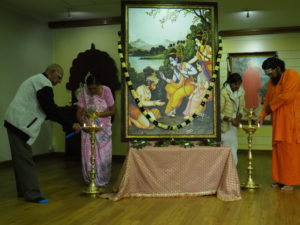 What is the role of Satyam in following Dharma?
What is the role of Satyam in following Dharma?
- Satyam (Truthfulness) is the silent energy, or heroism through which one can transform the right intellectual notions into right thoughts and actions; at the emotional and physical level.
- Sometimes, we do understand what our role is and what we are supposed to do, but we are not able to do it. Satyam gives the energy, the shakti that is required to follow one’s dharma.
- You have to tolerate the pain and do the right thing as per your dharma. And after doing so repeatedly, the pain will lessen. This capacity that you discover in yourself is Satyam.
- It surely is difficult to follow our dharma. But if we only do easy things in life, we will make our life difficult. When we do difficult things which are as per dharma, we make our life easy in the long run.
- One need guts, courage and tenacity to percolate one’s dharma at the emotional level, physical level, schedule level and interaction level.
- Valmiki Ramayana declares, “Satya alone is the Ishwar! Truth is God!” It means one should live that life which we can speak of without hesitation. When we live a dharmik life, we have no fear and reason to hide anything.
Glory of Satyam
- Satya is a Shakti, and every shakti grows only when we apply it. If you walk for one kilometre one day, then the next day you can walk little more. The same applies to living a life of Satya.
- It is because we don’t practice Satyam, that we are unable to take bigger resolutions in life, unable to control our senses, and unable to leave our attachment and aversion. Once dharma is understood, the dharma-transformer (Satyam) has to be brought in us, and the best way to bring it is by practicing it.
- He who abides in Satyam, he alone can contribute, serve, give and be an asset to the society. Such a person is highly predictable and dependable. He is not an erratic and moody person who thinks, and talks just anything.
- Bhagavan Ram says in Valmiki Ramayana that the person who doesn’t abide in Satyam does paap (sin) by body, mind and speech. And because of that he loses out on the best in life. “Land, fame, Lakshmi come to him who has Satya,” Bhagvana Ram has said.
- One who has Satyam in life, he is an expert at finding out what is his respective duty at any given time. Many things that we ought to do are not told by anybody, we need to find out ourselves.
- Others may give pointers and indication but particularities and how exactly to do it, is our area. This is brought out spectacularly in the characters and responses of both Bharatji and Ram Bhagvana.
- As per the advice of Guru and elders, Bharatji could have taken the throne, but he was so established in Satyam, he knew exactly where his swadharma lay, and went straight to Chitrakoot to offer the kingdom at Bhagvana Ram’s feet.
- In Chitrakoot, as Bharatji was trying to persuade Bhagavan Ram to return to Ayodhya, Vasishthaji came with a big list of kings of Raghuvansh. He said that as per the records, it has always been the eldest son who became the king, never the younger son, and therefore Bhagavan Ram should rule the kingdom.
- But Bhagavan Ram was established in His swadharma—like Himachal, He was absolutely unshakable. He said, “I am indebted to my father and I have to follow his words to get free from those debts.”
The Indescribable Heights that Satyam takes us to
The glory of Satyam, and how it elevates a person to unimaginable heights can only really be described through Bharatji’s most exquisite example.
- In Chitrakoot, when akaashvaani happened (a celestial voice came) which said, “O Bharat, please allow Ramji to do his dharma!” Bharatji fell at the feet of Bhagavan Ram and pleaded, “O brother, I don’t have the capacity to rule such a big kingdom.”
- When Bharatji kept crying inconsolably, Bhagavan Ram embraced Bharatji, lifted him and made him sit on his lap. Bhagavan Ram said, “O Bharat, listen! How can you not rule? You have so much of vinaya (humility). Don’t worry!”
- When this was said, then Bharatji understood that Bhagavan Ram would stay in exile. He brought Ramji’s paduka (slippers) and said, “O my beloved brother Ram! Please put your feet on these. These paduka will protect the whole world.”
- Bhagavan Ram placed His feet on the paduka, and gave them to Bharat. In the most touching moment, Bharatji offered pranaams to the paduka, lifted them on his head, and said, “I will also live as you are living. I will also wear the bark of tree and eat bulbs and fruits. Like you are living in the forest, I will also live outside the city.”
- “Every day I will just count the days for you to return,” said Bharatji. “I will wait for this time to get over. I will wait for 14 years, and if I don’t see you after 14 years, I will burn myself in the fire.” Bhagavan Ram embraced him and promised that He would not delay at all.
- The whole assembly of people was in tears to see the two great mahatmas embracing each other.
- It is written in Valmiki Ramayana that, when Bharatji left, Bhagavan Ram returned to his kutia and cried inconsolably. He felt like, ‘I couldn’t obey my brother. Such a renunciate brother Bharat is.’
Learn to Be Like Bharatji
- When Bharatji returned to Ayodhya, he said, “I cannot live here. This is a desolate place.” He went to Nandi gram (nearby village) and made an altar with his own hands. He brought the throne and placed Bhagavan Ram’s paduka on the throne.
- Bharatji’s bhaav was, “My brother has given me kingdom to keep as a trust. I am a trustee.” Bharatji had so much selflessness. There was not even a whiff of ego or selfishness in him.
- The demand of the world with everybody is ‘Don’t be selfish with me. You live with any person but don’t be egoistic.’
- Not having ego means – ’My desires have no value. I am not living for myself. I am living to fulfil some divine vision. My life is not for me. I am just an executor of Lord’s plan.’
- Bharatji used to sit near Bhagavan’s paduka for hours together and think, “I will worship these padukas, and the moment the Holder of Paduka will come, I will hold His feet, and I will become His servant.”
- It is written that Bharatji worshipped the Padukas so much that the Padukas started talking to him and guiding him.
- When someone becomes very selfless and is ready to leave everything for Bhagvana, Bhagvana is touched. Such people are able to offer themselves completely to the Lord, to the Guru, to some higher ideal.
Bharatji is the epitome of such selflessness. Let us become like Bharatji!
Day 5
On Day 5 Swami Abhedanandaji graced the audience with ‘How To’ list, to compliment the ‘To Do’ list we all have but keep failing at.
Swamiji took us through an in-depth inquiry into why our best intentions seem to always fizzle out, and gave us some superbly practical tips on how to turn our daily failure into enduring success.
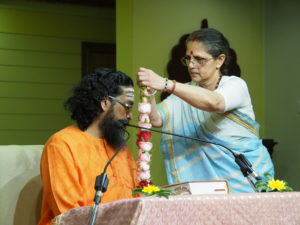 Immediate Relief OR Long term Solution – Choose wisely
Immediate Relief OR Long term Solution – Choose wisely
- Our life is mostly centered on immediate gratification. We do whatever is most convenient for us, looking for instant joy, or immediate relief from problems. We fail to realise that this may lead to serious problems in the future.
- We have all experienced that at times, we did, said or thought something which took away our immediate pain, but in doing so, invited long-term pain.
- If we have long-term emotional pain, we should understand that somewhere in the past, we went for instant gratification. We did what we “felt like” doing, instead of what we “should” have done.
- Dharma gives us the ability to hold ourselves from seeking immediate relief. It shifts the mind’s attention towards long-term relief, and provides far-sightedness. One learns to evaluate his actions as per the scriptures, Guru, and the internal Self.
- When we only do what we “feel” like doing, then the ‘feeling mind’ gains strength. The erratic and emotional mind becomes stronger. The big loss here is that we have nourished the mind which is feeling-oriented rather than the mind which is dharma-oriented.
- Such a mind is anti-Guru, anti-scripture and anti-God. It only wants the joy of the moment; it is blind to the pain of the future.
Dharma says ‘Stop’!
- Before we act, we need to be able to stop ourselves and ask – ‘Is this action/thought right? Will it please God? Will it please Guru? Is it as per the scriptures?’
- Dharma says – ‘Stop!’ Dharma is the training of the mind to pause. “No, don’t cater to the senses. No, don’t entertain thoughts of anger & lust. Do your duty even if you are tired and sleepy. Complete the work!”
- When we follow our dharma, and follow the rules of the society, of the house, we develop the habit to hold ourselves. We develop the ability to say ‘No’ to outer temptations and inner reactions.
- We must develop a dharmik personality which is able to fight laziness, lethargy and is able to shout down the illogical arguments of the mind.
- “I don’t feel like doing puja today, but still I will do it as it is my dharma. Even if I am tired, I will complete it. It will make my God and Guru happy.” When you think like that, and perform your daily sadhana, then over time, the resistance of the mind is lessened, as it knows that you are tougher than before.
Lights ON
- Dharma is a training of the intellect to keep the “Lights On”–scriptural light, Guru’s light! What you heard in the satsang, it should be glittering all the time in your mind i.e., it should be readily available for you to apply in your actions, thoughts and speech.
- You have to train the mind every day to do a little better. Training means – you are making the mind do something which it is not good at; and which is hard for it to do, so that after some time the mind can do it spontaneously and effortlessly.
- Towards your ‘wrong mind’, you have to be heartless and ruthless. If not, you will cultivate a ‘demon mind’ for yourself.
Be a Trustee
- Our house, our job, our car, our wealth, who does it all belong to? No person, no position belongs to us. In hundred years, everything will belong to someone else. The fact is everything belongs to the Lord alone.
- We are just a small speck of the Viraat (Infinite Lord). And since our body is the part of the Macrocosm, it should work for the Macrocosm. Just as various parts of our body work for the entire body, and not for themselves.
- The principle that everything belongs to the Lord is very important to understand, as it forms the basis of Karma Yoga. With this understanding, there is a lateral shift in our thought process.
- The person then performs all his chores as a trustee of the Lord. When we work for the Macrocosm, we start earning/working for the Lord, who is expressing as our family. We take care of our child by being a trustee of God. We do not have any independent relationship with anybody.
- We must constantly check how the Lord wants us to live, and live accordingly.
- The result of such thinking is very big – if something doesn’t happen as per our desire, we are not worried or disturbed. All sad people are sad and disturbed because they try to have individual relationships with the world, and do not bring the Lord into the equation.
- When any part of the body works independently, it becomes cancerous. When an individual acts for himself, the Cosmic Power withdraws Grace from his life.
- This is the principle behind Bharatji taking the Paduka of the Lord. Bharatji took care of the kingdom as the Lord’s kingdom. Whatever work came, Bharatji went to the Lord’s Paduka and took advice. When someone praised him, he went to the Paduka and offered the praise to the Lord.
- Mixing “from” and “for” in all our actions is Karma Yoga. “Where from” you get and “for whom” you do… Both should be Lord alone!
Day 6
Soaking everyone in the cool showers of Valmiki Ramayana katha during the six days of Monthly Yagna, Swami Abhedanandaji enriched each listener with extremely essential pointers for living a surrendered spiritual life. We are glad to share with you an excerpt from the last day’s satsang:
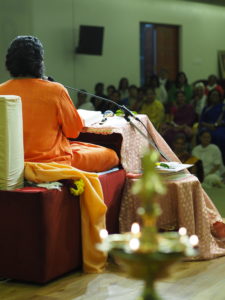 Karma-Yog as Taught by its Greatest Acharya: Bharatji
Karma-Yog as Taught by its Greatest Acharya: Bharatji
Shri Bharatji installing Bhagavan Ram’s Paduka on the throne of Ayodhya, and ruling on behalf of Paduka, beautifully portrays the principle of Karma-yog. This principle should be clearly understood and personalised by each human being.
- In life, there are areas where we have a certain amount of freedom. For instance, in our home, we can arrange things as per our liking, or with our spouse and children, we can act in our chosen manner.
- We have been given some authority by our prarabdh (fate) to call our house, family, job as ‘mine’. But how we present ourselves in the areas where we have authority, is an important thing to analyse.
- Every person has an area of bondage where he is likely to be caught, or likely to suffer in. And the interesting point is – the area where our freedom lies, that is exactly the area of our bondage too.
- One cannot have bondage in the area where he has no freedom. For example, you have no freedom with the neighbour’s house, so you will not be bound by his house. Similarly, you will never be bound by someone else’s spouse and children.
- But where you have the freedom to say ‘you are my wife’, ‘you are my child’, ‘you should act as per my wish’, that is your area of bondage. That is where comes attachment, hatred, aversion and ahankaar (ego). And gradually it becomes a disease; and the very cause for the person’s fall.
- The antidote for this is the study of Shri Bharatji’s immaculate character. Bharatji is the acharya (teacher) of all sadhana. He demonstrates that everything and every person in life belong to the Lord, and should be offered to the Lord alone.
Does the World Really Belong to You?
- It is a false notion that the people and the objects around us belong to us. If they belonged to us, then they should have been in our full control. But it is a proven fact that no person and no situation is under our control.
- There is not even a single person in your life whose nature is exactly as you want, or who always does what you want. Very easily we say ‘he is mine or she is mine’, but there is no truth in that.
- Even our body doesn’t obey us. Who wants diseases? But we get diseases. Who wants old age? But we all get old. There is nobody in our life, including our own body and mind which follows what we want.
- But there is Someone who can make everybody follow Him. He can make anyone dance to His tunes because everything belongs to Him, and that is the Lord.
- Bharatji demonstrated that instead of trying to be the ‘Nidhipati’, one should become the ‘Pratinidhi’. ‘Nidhipati’ means becoming the boss (owner) of the objects and people. While ‘Pratinidhi’ means becoming a representative and working on behalf of the Lord.
Advantages of being a Pratinidhi
- Once you become a Pratinidhi, the beautiful bhaav (emotion) of surrender comes in your mind, which takes away your ‘bhog bhavana’ (desire to enjoy & indulge).
- You become attentive as to what God wants from you. And you cease to have independent relation with anybody.
- You see everything with Prasad buddhi and Puja buddhi. With what you have to do, you have Puja buddhi i.e., you perform actions as worship of God. And with what you get, you have Prasad buddhi i.e., you accept everything as Lord’s Prasad, be it good or bad.
- This buddhi that ‘I am working for the Lord’ is very important. This is the crux of Karma-yog, which Bharatji illustrated. This is the only way to get out of painful bondages, otherwise the world becomes very difficult to handle.
- One more beautiful thing happens when a person becomes a Pratinidhi – he gets tremendous energy. For whom you work, that person’s or that thing’s energy comes in you.
- If you work for the Whole (God/Macrocosm), then the Whole will support you, Macrocosm will support the Microcosm. Moment you remove God and see any person or situation, it will be difficult to handle.
How to deal with difficulties in life?
- Difficulty in life means – either there is a difficult person who is not toeing your line and you have to live with him, or you have to live with some difficult situation like poverty, or house issues, or office problems. You cannot run away from these difficulties.
- To deal with any kind of difficult person, there is only one way, and that is to NOT repeatedly think that ‘he/she has given me a lot of difficulties’, rather think that ‘he is God’s person’.
- The moment you think of him as God’s person, the very attitude of looking at him will differ. You will have less expectation. You will say, ‘O God, he is your person, now You deal with him’.
- Your role should be just to serve the other person. Any relation in the world should be ONLY for serving & giving. You should just act as a medium to connect the other person to God.
Anusuyaji’s Beautiful Instructions
In Valmiki Ramayana, when Bhagavan Ram, Sitaji and Lakshmanji visit sage Atreyi, he introduces them to his wife Anusuya. Atreyiji describes Anusuya as a celebrated hermit, ever-free from anger. Anusuyaji gave some beautiful teachings to Sitaji, the essence of which applies to all seekers.
- As men and women have different bodies, they also have different natures. In general, men tend to be buddhi pradhaan (intellectual); and women are manas-pradhaan (emotional). Please note, it is not implied here that women are not intellectual, or that men are not emotional.
- There are various examples of highly intellectual women; and various examples of highly emotional and caring men. Here, the roles are being addressed ‘in general’ and said which qualities tend to be predominant in whom.
- It is essential to have highly developed emotions, to be able to bring up a family but the flip-side of being predominantly emotional is that emotions like hatred, jealousy, expectations etc. also tend to dominate. Hence there should be a balance in one’s intellectual and emotional personality.
- In a woman whose emotions are extremely dominant, there is a basic urge to surrender to someone. When such a woman gets a husband with extremely divine qualities, it is natural for her to have aadar buddhi towards him (feeling of respect and reverence). She then serves him whole-heartedly.
- This then produces the superlative combination; where the woman has extreme surrender and the man is extremely divine and protective. It is such couples who have given birth to great saints like Chaitanya Mahaprabhu, Gurudev Swami Chinmayananda, Tapovan Maharaj. Home is the first institution of a child. The child closely observes its parents’ behaviour.
- A man gives identification to the house, but the joy and happiness of the house depends on the woman as she is the one who binds the house and lays the right foundation. Both are great in their own unique way. And hence both should live in perfect harmony so they can become facilitators in each other’s spiritual growth.



